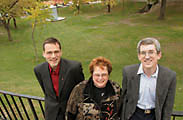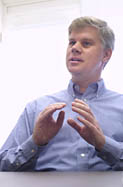Principal's teaching awards winners
Principal's teaching awards winners McGill University
User Tools (skip):
Principal's teaching award winners
If you hear voices rhythmically chanting superhero names on campus, you haven't stumbled upon an impromptu comic book convention. Chances are you're just within earshot of one of Reisa Lipszyc's music classes. She has her students pick a category to chant words from when she works on rhythm in her first-year core music class. One year the students voted for beer brands, another year they chose superheroes.

Award winners Andrew Kirk, Reisa Lipszyc, and John Silvius
Owen Egan
The Faculty of Music recruiter and teacher has just won the Principal's Prize for Excellence in Teaching in the faculty lecturer category. Linguistics professor Charles Boberg has been selected for the assistant professor category, engineering professor Andrew Kirk has been chosen in the associate professor category and biochemistry professor John Robert Silvius receives the award for full professor.
"A teacher can inspire a student for a lifetime," says Principal Munroe-Blum, adding that it was a challenge to select only four from all the high-quality nominees.
Lipszyc says when she travels to recruit music students, she often advises them to follow their passion. She lives her own advice: "I love music and I love teaching. One of my specialities in the faculty is working with first-year students, and I think I'm able to teach and also provide support at the beginning." Her obvious fondness for her students is reciprocated. When asked what the students write about her in their evaluations, she admits that sometimes it's comments like, "Reisa rocks!" and they mention her sense of humour and considerateness.
Her office is probably one of the most welcoming ones on campus too, given that she shares it with a bunch of cuddly friends. "I collect teddy bears, wherever I go to recruit," she says; "and they're all over my office."
While singing in the classroom helps the students stay focused, her first-year course also covers the drier material such as sight reading and how to notate what you hear. "A lot of students don't appreciate the course when they take it," she laughs, "but I have yet to meet one grad who has said that it was a waste of time. It's only in retrospect that people can really appreciate it."
While Lipszyc is excited to win the award, she says the biggest thrill was learning how much her class meant to the students, as they made clear in the nomination. She's always happy when she sees her old students years later: "It's very exciting to see the successes of your students."
Andrew Kirk, who teaches courses on electromagnetic waves and optics, distributes two course surveys during the semester in order to see what is working for his students.
He must be doing something right because this is the second Excellence in Teaching Award he has landed, in addition to a departmental award. The first was at the assistant professor level in 2002.
In 2003 he started research that surveyed engineering students on preferred teaching methods and interviewed the engineering instructors named as being particularly successful. "I wanted to find out what actually works in terms of strategies of teaching and learning in engineering, based in the reality of McGill students."
Kirk uses techniques such as animating graphs and bringing in props to keep students interested and make the abstract real. He has even played his trombone in class to demonstrate how resonant frequencies can be changed. Kirk also breaks up the lecture format by asking students questions during class and conducting group problem-solving. He makes his notes and lectures available to students online so they are better able to focus and participate during class.
"In teaching you have to ask questions about why you're doing what you're doing — are students really learning this? It's the same process as research in many ways. So then the question is, how much do you value that? We spend so much time on teaching, and be spend that time and not enjoy it and not feel satisfied by it would be a waste."

Charles Boberg, winner of the principal's award for teaching.
Owen Egan
Charles Boberg has been interviewed by cheeky Frank magazine to provide his expertise in linguistics to the question of why the word "sponsorshipgate" never caught on as a description of the federal sponsorship scandal. While Boberg gave the humour-oriented publication some pithy quotes, his approach to his teaching is serious.
When he first came to McGill he had never taught a class before, Boberg says, but teaching came quite naturally to him. He worked in high school as a tour guide and became comfortable speaking to large groups of people. Boberg also says he had a lot of good role models because he himself had a number of inspiring teachers as a student.
"I think the subject matter is quite entertaining in itself. I like to invite students to bring their experiences to class and share anecdotes about the observations they've made about the kinds of phenomena we're looking at, and I think that helps a lot."
He often plays examples of regional dialects in class and tries to relate the work to questions outside the subject of linguistics, such as how differences in use of language according to social class are evaluated, and how that reflects social bias.
He says he assigns his students field projects. "Sociolinguistics is very much databased, with a big emphasis on observing language as it is used in the community, so part of all the classes is that they have to go out and collect data on language and regional uses."
"Students can come and talk to me and I remember their name and talk to them about their plans and aspirations and I think that puts a human face on the university."
John Silvius teaches biochemistry and biophysics courses to final-year undergraduate students and is adept at using highly technical tools in his research on cellular signalling. When it comes to teaching his class, though, he finds that just chalk and blackboard work best. "I sometimes have things twirling around the room to show what molecules do, to the general amusement of the class, but I actually like working on blackboards. You start with some logic and ideas and a piece of chalk and try to build it up as concretely as you can.
"There are no really good textbooks in this area so I work from the current literature and try to make it intelligible and meaningful to undergraduates. The students are very sharp, so there's no problem there, but it's taking the literature, which is not pre-organized, and trying to make a coherent story out of it, that is kind of a fun challenge."
He is always pleased to hear students say they "now truly understand a technique they have been using for some time. Some of the techniques I teach are ones the students have indeed been doing since their first year. When I think now they've really got a handle on the principles from the ground up I'm always very happy with that, because that's exactly what I set out to do."
Silvius tries to get a feel for how the students are faring during class. He says he occasionally uses incidental humour. "If the class doesn't laugh, then you know they're being overwhelmed."
In addition to maintaining flexible office hours, he is readily accessible to his students by email. If a student asks a particularly good question, he sends the information to the entire class. He also posts images and illustrations for the class on the biochemistry undergraduate society's website as a follow-up to material covered in class.
He says he enjoys "taking a diverse body of info and building it up from the simple to powerful ideas that are intelligible to somebody who is seeing it for almost the first time."
While Silvius says he is pleased and honoured to receive his award, he says he appreciates the effort by the university to put a focus on teaching. "Obviously research and teaching are our dual missions, but sometimes research tends to get rewarded by outside criteria more often. I think it is commendable that the university is reinforcing the teaching component."
